六年级-小学英语-一般将来时
六年级四种时态总结
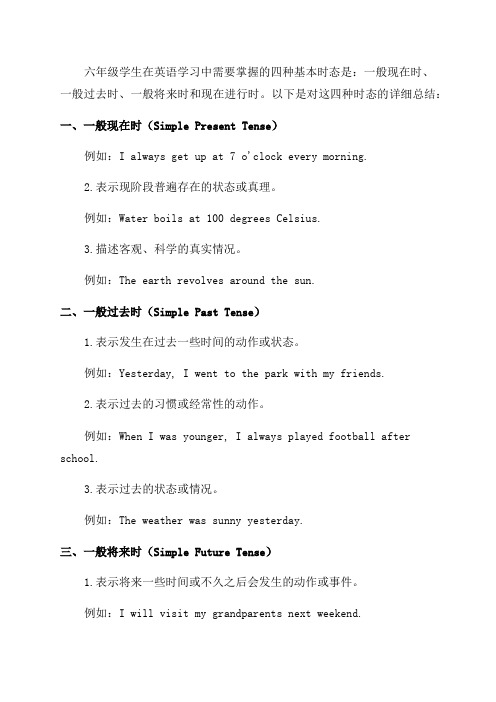
六年级学生在英语学习中需要掌握的四种基本时态是:一般现在时、一般过去时、一般将来时和现在进行时。
以下是对这四种时态的详细总结:一、一般现在时(Simple Present Tense)例如:I always get up at 7 o'clock every morning.2.表示现阶段普遍存在的状态或真理。
例如:Water boils at 100 degrees Celsius.3.描述客观、科学的真实情况。
例如:The earth revolves around the sun.二、一般过去时(Simple Past Tense)1.表示发生在过去一些时间的动作或状态。
例如:Yesterday, I went to the park with my friends.2.表示过去的习惯或经常性的动作。
例如:When I was younger, I always played football after school.3.表示过去的状态或情况。
例如:The weather was sunny yesterday.三、一般将来时(Simple Future Tense)1.表示将来一些时间或不久之后会发生的动作或事件。
例如:I will visit my grandparents next weekend.2.表示打算、计划或意图。
例如:I am going to study hard for the exam.3.表示预测、预言或非即刻发生的事情。
例如:It will rain tomorrow.四、现在进行时(Present Continuous Tense)1.表示现在正在进行的动作或状态。
例如:I am studying English now.2.表示临时的、目前的事情。
例如:She is staying at her friend's house this week.3.表示将来已确定的计划或安排。
六年级英语-一般将来时(含练习题)
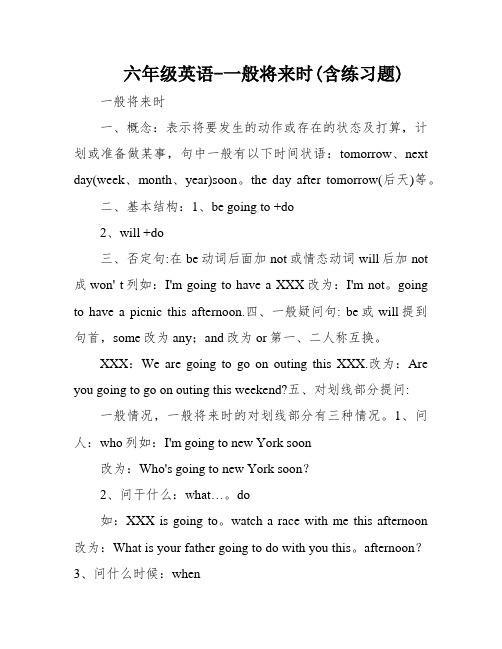
六年级英语-一般将来时(含练习题)一般将来时一、概念:表示将要发生的动作或存在的状态及打算,计划或准备做某事,句中一般有以下时间状语:tomorrow、next day(week、month、year)soon。
the day after tomorrow(后天)等。
二、基本结构:1、be going to +do2、will +do三、否定句:在be动词后面加not或情态动词will后加not 成won' t列如:I'm going to have a XXX改为:I'm not。
going to have a picnic this afternoon.四、一般疑问句: be或will提到句首,some改为any;and改为or第一、二人称互换。
XXX:We are going to go on outing this XXX.改为:Are you going to go on outing this weekend?五、对划线部分提问: 一般情况,一般将来时的对划线部分有三种情况。
1、问人:who列如:I'm going to new York soon改为:Who's going to new York soon?2、问干什么:what…。
do如:XXX is going to。
watch a race with me this afternoon 改为:What is your father going to do with you this。
afternoon?3、问什么时候:when列如:She's going to go to bed at nine 改为:When is going to bed?六、同义句:。
小学六年级英语一般将来时四个句型
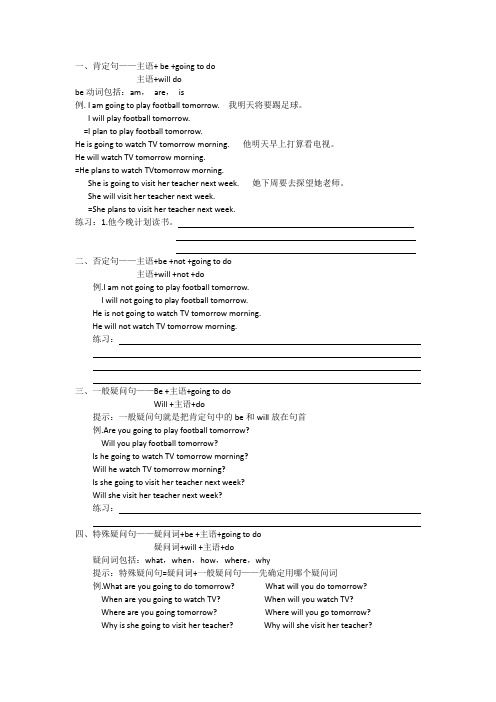
一、肯定句——主语+ be +going to do主语+will dobe动词包括:am,are,is例. I am going to play football tomorrow. 我明天将要踢足球。
I will play football tomorrow.=I plan to play football tomorrow.He is going to watch TV tomorrow morning. 他明天早上打算看电视。
He will watch TV tomorrow morning.=He plans to watch TVtomorrow morning.She is going to visit her teacher next week. 她下周要去探望她老师。
She will visit her teacher next week.=She plans to visit her teacher next week.练习:1.他今晚计划读书。
二、否定句——主语+be +not +going to do主语+will +not +do例.I am not going to play football tomorrow.I will not going to play football tomorrow.He is not going to watch TV tomorrow morning.He will not watch TV tomorrow morning.练习:三、一般疑问句——Be +主语+going to doWill +主语+do提示:一般疑问句就是把肯定句中的be和will放在句首例.Are you going to play football tomorrow?Will you play football tomorrow?Is he going to watch TV tomorrow morning?Will he watch TV tomorrow morning?Is she going to visit her teacher next week?Will she visit her teacher next week?练习:四、特殊疑问句——疑问词+be +主语+going to do疑问词+will +主语+do疑问词包括:what,when,how,where,why提示:特殊疑问句=疑问词+一般疑问句——先确定用哪个疑问词例.What are you going to do tomorrow? What will you do tomorrow?When are you going to watch TV? When will you watch TV?Where are you going tomorrow? Where will you go tomorrow?Why is she going to visit her teacher? Why will she visit her teacher?。
小学一般将来时讲解

小学一般将来时讲解1. 介绍小学一般将来时是英语语法中的一种时态,用来表示将来发生的行动或事件。
在这种时态中,动作与时间的关系是相对的,即动作将在将来某一时刻发生。
2. 构成小学一般将来时由情态动词 "will" 或 "shall" 加上动词原形构成。
下面是一些例子:- I will go to school.- She will play basketball.- We shall see a movie.3. 肯定句结构小学一般将来时的肯定句结构是:主语 + will/shall + 动词原形+ 其他。
4. 否定句结构小学一般将来时的否定句结构是:主语 + will/shall + not + 动词原形 + 其他。
5. 疑问句结构小学一般将来时的疑问句结构是:Will/Shall + 主语 + 动词原形+ 其他?6. 使用场景小学一般将来时常用于以下场景:- 表示未来的计划或打算:I will go to the park tomorrow.- 表示预测:It will rain later.- 表示意愿或请求:Will you help me with my homework?7. 注意事项在小学一般将来时中,我们要注意以下几点:- 不使用"will"或"shall"来表达对他人的承诺或决定,如"I promise"或"I decide"。
- 在口语中,经常使用"will"而不是"shall"。
- 在第一人称疑问句中,我们可以使用"shall"代替"will",但这并不常见。
希望这份文档对你的小学一般将来时的学习有所帮助!。
六年级英语知识点时态
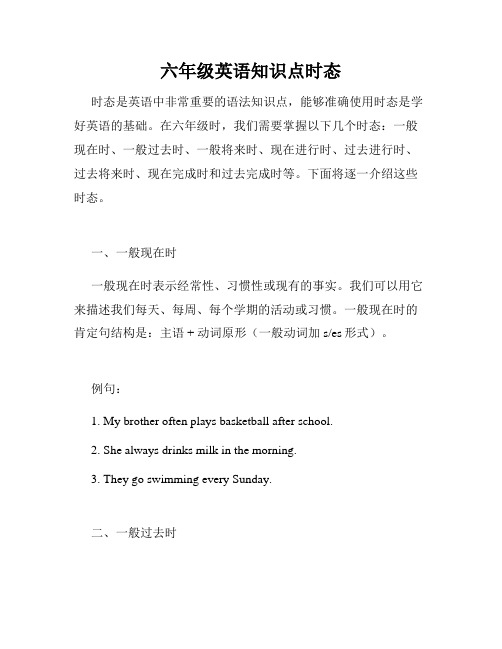
六年级英语知识点时态时态是英语中非常重要的语法知识点,能够准确使用时态是学好英语的基础。
在六年级时,我们需要掌握以下几个时态:一般现在时、一般过去时、一般将来时、现在进行时、过去进行时、过去将来时、现在完成时和过去完成时等。
下面将逐一介绍这些时态。
一、一般现在时一般现在时表示经常性、习惯性或现有的事实。
我们可以用它来描述我们每天、每周、每个学期的活动或习惯。
一般现在时的肯定句结构是:主语 + 动词原形(一般动词加s/es形式)。
例句:1. My brother often plays basketball after school.2. She always drinks milk in the morning.3. They go swimming every Sunday.二、一般过去时一般过去时表示发生在过去某个具体时间或某一段时间中的动作或状态。
一般过去时的肯定句结构是:主语 + 动词过去式。
例句:1. We went to the zoo yesterday.2. He played soccer last weekend.3. She studied Chinese history last year.三、一般将来时一般将来时表示将要发生的动作或存在的状态。
一般将来时的肯定句结构是:主语 + will + 动词原形。
例句:1. I will visit my grandparents next month.2. We will have a picnic in the park tomorrow.3. She will clean her room this evening.四、现在进行时现在进行时表示现在正在进行的动作。
现在进行时的肯定句结构是:主语 + am/is/are + 动词ing形式。
例句:1. They are playing tennis in the park now.2. She is reading a book at the moment.3. We are watching a movie.五、过去进行时过去进行时表示在过去某个时间点正在进行的动作。
一般将来时(课件)人教PEP版英语六年级下册

时间状语
tomorrow 系列: tomorrow morning tomorrow afternoon tomorrow evening the day after tomorrow at 7:00 tomorrow morning
next 系列:
next time
next day
next week
A. are going B. are going to C. is going to
( C )3. We are going to cook some fish _____.
A. yesterday
B. last night
C. next weekend
( A )4. _____ you _____ TV every day?
A. Do; watch
B. Are; watching
C. Did; watch
( B )5. He _____ films tomorrow evening.
A. is watching B. is going to watch
C. watched
( C )6. Look!The girls _____ on the bridge over there.
一、一般将来时的用法 一般将来时表示将来某一时刻的动作或状态,或将来某一段 时间内要发生的动作或事情。 时间标志词:this afternoon, this evening, tomorrow, tomorrow+ 时间, the day after tomorrow, next+time/day/week/year … 等。 如: It is going to rain tomorrow. 明天将会下雨。
小学一般将来时知识点总结

小学一般将来时知识点总结引言小学英语是孩子们学习英语的起点,学好小学英语对以后的学习起到重要的基础作用。
其中,学习一般将来时是非常重要的一部分。
掌握一般将来时的用法可以帮助孩子们表达将要发生的事情,培养他们的语言表达能力。
本文将总结小学一般将来时的知识点。
一般将来时的定义一般将来时表示将要发生的动作或存在的状态。
它通常用于描述将来的事件、习惯或计划等。
一般将来时的构成一般将来时由助动词“will”和动词原形构成。
通常,在句子中,助动词“will”位于主语之后,动词原形位于助动词之后。
例如:•I will go to the park tomorrow.•She will eat dinner at home tonight.一般将来时的用法表示将要发生的事情一般将来时通常用于表示将来要发生的事情。
例如:•I will visit my grandparents next week.•We will have a party on Saturday.表示将来的打算或意愿一般将来时还可以用于表示将来的打算或意愿。
例如:•Tom will study hard to pass the exam.•They will help the homeless people.表示将来的预测有时,一般将来时也可以用于表示将来的预测。
例如:•It will rain tomorrow.•She will become a famous singer in the future.表示意见或推断一般将来时还可以用于表示意见或推断。
例如:•I think he will be successful in his career.•They believe the team will win the game.表示习惯或常态一般将来时还可以用于表示习惯或常态。
例如:•They will usually go for a walk after dinner.•He will always help his classmates.一般将来时的注意事项在使用一般将来时时,有一些需要注意的事项。
六上英语一般将来时,现在进行时,一般现在时,情态动词规则
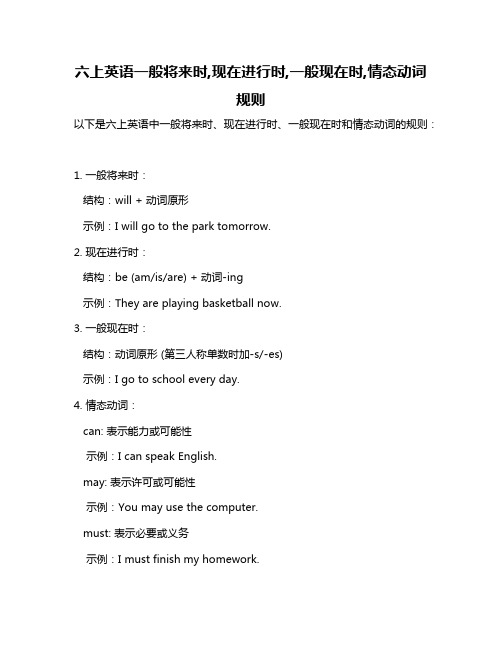
六上英语一般将来时,现在进行时,一般现在时,情态动词
规则
以下是六上英语中一般将来时、现在进行时、一般现在时和情态动词的规则:
1. 一般将来时:
结构:will + 动词原形
示例:I will go to the park tomorrow.
2. 现在进行时:
结构:be (am/is/are) + 动词-ing
示例:They are playing basketball now.
3. 一般现在时:
结构:动词原形 (第三人称单数时加-s/-es)
示例:I go to school every day.
4. 情态动词:
can: 表示能力或可能性
示例:I can speak English.
may: 表示许可或可能性
示例:You may use the computer.
must: 表示必要或义务
示例:I must finish my homework.
shall: 表示建议或命令
示例:You shall stay out of the garden.
will: 表示意愿或将来时间
示例:I will help you.
这些规则是英语语法中的基础部分,需要不断练习和巩固。
如需更多信息,建议查阅语法书籍或咨询英语教师。
人教版六年级上册英语语法《一般将来时》

1、定义:表示在将来时间里打算干的事情。 2、句型结构: 人称主语+ be going to + 动词原形+ (时间)
e.g. 1、I’m going to buy some books tonight. 2、we are going to clean our classroom tomorro 3、She is going to go shopping . 4、John is going to play chess with Mike. 5、They are going to the cinema this evening.
在将来时中,要注意区分几个疑问词 的用法:
What When Where How 什么 (提问事情) 什么时候 (提问时间) 哪里 (提问地点) 怎样 (提问方式)
请认真观察答句,根据答句写出问句。
What are you going to do tomorrow? 1\ __________________________________ We are going to take a trip tomorrow. What is Sarah going to buy? 2\ __________________________________ Sarah is going to buy a comic book . Where are they going this evening? 3\ __________________________________ They are going to the cinema this evening. When is Mike going to the park? 4\ __________________________________ Mike is going to the park next week. 5\ __________________________________ How are you going to the zoo? I’m going to the zoo by bike. Are you going to read books tonight? 6\ _________________________________ Yes, I am going to read books tonight. Is she going to play football after school? 7\ _________________________________ No, she is going to play basketball after school. Do you go there by bus? 8\ __________________________________ No, I go there on foot.
六年级-小学英语-一般将来时

2. Where(询问地点) 例: Where are you going this evening? 今天晚上你打算去哪里? I am going to the bookstore. 我打算去书店。
3. when(询问时间) 例: When are you going to buy the book? 你打算什么时候去买书? I am going at 5 o'clock. 我打算5点钟去。
is
is
+动词原形
“be going to + 动词原形”表将来 构成一般将来时态,表示计划要做的事或根据目 前推测将要发生的动作,意为“打算,将要”
I am going to buy a book. He is going to read a book. She is going to take a look. We are going to take a trip. They are going to play football.
I ______ going to …. You ________ going to …
are
am
He _______ going to …
She ______going to …
is Jack _______ going to … are My parents ______ going to … are Jack and Tom ________going to …
3.一般疑问句:Be+主语+going to+动词原形+将
来时间?
例:Are they going to read a book tonight ?
句型转换。 1.Mike is going to play football
六年级英语一般将来时讲解加练习
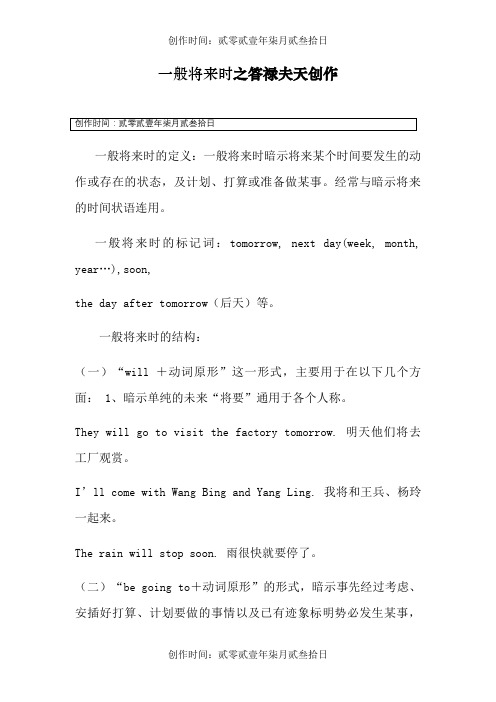
一般将来时之答禄夫天创作一般将来时的定义:一般将来时暗示将来某个时间要发生的动作或存在的状态,及计划、打算或准备做某事。
经常与暗示将来的时间状语连用。
一般将来时的标记词:tomorrow, next day(week, month, year…),soon,the day after tomorrow(后天)等。
一般将来时的结构:(一)“will +动词原形”这一形式,主要用于在以下几个方面: 1、暗示单纯的未来“将要”通用于各个人称。
They will go to visit the factory tomorrow. 明天他们将去工厂观赏。
I’ll come with Wang Bing and Yang Ling. 我将和王兵、杨玲一起来。
The rain will stop soon. 雨很快就要停了。
(二)“be going to+动词原形”的形式,暗示事先经过考虑、安插好打算、计划要做的事情以及已有迹象标明势必发生某事,意为“打算;就要”。
如:1)We're going to meet outside the school gate. 我们打算在校门口见面。
2)Dad and I are going to watch an opera this afternoon. 今天下午我和爸爸打算去看歌剧。
3)Look! It's going to rain. 瞧!快下雨了。
练习一.填空1.My brother ______ (go) to Shanghai next week.2.Mary ________ (see) her grandfather tomorrow.3.David ________ (fly) kites in the park this weekend.4.I_______ (make) a plan for English study in three days.5.Who _______ (be) going to learn a new song next Tuesday?6._______ (be) you going to Beijing tomorrow?7.We _______ (not be) going to have lunch at 12:00 tomorrow.8. Where _______ you _______ (leave) for tomorrow?9._______ Tom _______ (have) a P.E. lesson next Monday?10. What _______ they _______ (watch) in thegym tomorrow?11.what _____ they _______( do ) tomorrow ?12.The boy _______( not have ) an English lesson tomorrow .13.________ you _______( learn ) Chinese next week ?14.I ________ ( arrive ) there tomorrow .15.Mike _________ ( not watch ) a movie tomorrow .1. ( ) She is going to ________ after school.A. listening to musicB. listens to musicC. listen to musicD. listened to music2. ( ) We _______ in Beijing in two days.A. will arrivesB. arrivesC. are going to arriveD. arriving3. ( )The students ________ dumplings tomorrow.A. is going to makingB. are makingC. will makeD. are make4. ( ) Are you going to_________ thirteen years old next year?A. will beB. areC. beD. go5. ( ) ___will see a play in 5 days?A. WhenB. WhatC. WhoD. Whose6. ( ) Mary______ English next year.A. will learnB. will to learnC. are going to learn.D. learns7. ( ) He’ll _____ shopping this afternoon.A. goingB. goC. goesD. went8. ( ) Will you ____ at the bus stop at 10:30?A. meetingB. meetsC. meetD. met9. ( ) Lily and I _______ the guitar. next week.A. am going to playB. are going to playC. will playsD. play10. ( ) How ______ Jenny ___ home tomorrow?A. does......goB. is……goingC. will……goD. do……go11. ( ) Who is going to _________ a song ?A. sings B singing C. to sing D. sing12. ( ) I _________in Beijing in three days.A. are going to arriveB. arriveC. will arriveD. arrives13. ( ) He _______some model planes tomorrow .A. going to makeB. is makingC. will make D makes14. ( ) Are you going to ___________a doctor next year ?A. will beB.. areC. beD. are going to15. ( ) She ________ you make supper this evening .A. helpsB. will helpC. is helpingD. is going help三.把下列句子酿成一般疑问句,并给出肯定和否定回答。
(完整版)小学英语一般将来时
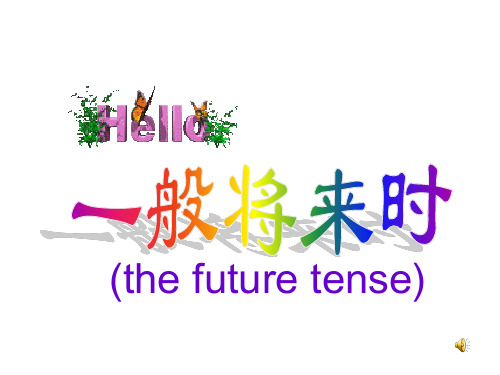
我下周三将要做家务。I will do the housework next Wednesday.
我下周四将要听音乐。I will listen to music next Thursday.
比较下列句子:
1. 我打篮球。 I play basketball.
3. 明天我们要下象棋。We are going to play chess tomorrow.
4. 明天他们要踢足球。They are going to play football tomorrow.
5. 明天露西要听音乐。Lucy is going to listen to music tomorrow.
写出同义句: 1. I am going to eat. → I _wi_ll _ea_t . 2. He is going to eat. → He _w_ill _e_at. 3. She is going to play piano. → She _wi_ll _pl_aypiano. 4. The cat is going to jump. → The cat w_ill _ju_m__p. 5. We are going to fly kites tomorrow. →We _w_ill _fly_k_ite_s tomorrow.
(the future tense)
•I’ m going to buy a book. •I’ m going to bake a cake. •I’ m going to walk near a lake. •We’ re going to take a trip. •I’ m going outside to play. •I’ m going to have a good day.
小学英语“一般将来时”语法知识
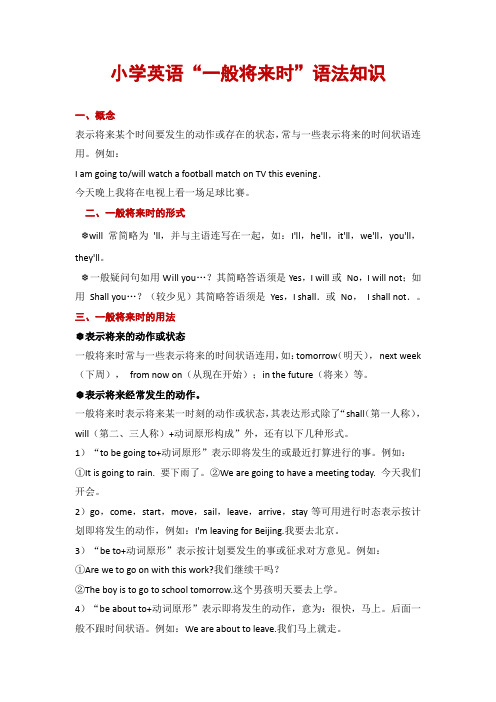
小学英语“一般将来时”语法知识一、概念表示将来某个时间要发生的动作或存在的状态,常与一些表示将来的时间状语连用。
例如:I am going to/will watch a football match on TV this evening.今天晚上我将在电视上看一场足球比赛。
二、一般将来时的形式❆will 常简略为'll,并与主语连写在一起,如:I'll,he'll,it'll,we'll,you'll,they'll。
❆一般疑问句如用Will you…?其简略答语须是Yes,I will或No,I will not;如用Shall you…?(较少见)其简略答语须是Yes,I shall.或No,I shall not.。
三、一般将来时的用法❆表示将来的动作或状态一般将来时常与一些表示将来的时间状语连用,如:tomorrow(明天),next week (下周),from now on(从现在开始);in the future(将来)等。
❆表示将来经常发生的动作。
一般将来时表示将来某一时刻的动作或状态,其表达形式除了“shall(第一人称),will(第二、三人称)+动词原形构成”外,还有以下几种形式。
1)“to be going to+动词原形”表示即将发生的或最近打算进行的事。
例如:①It is going to rain. 要下雨了。
②We are going to have a meeting today. 今天我们开会。
2)go,come,start,move,sail,leave,arrive,stay等可用进行时态表示按计划即将发生的动作,例如:I'm leaving for Beijing.我要去北京。
3)“be to+动词原形”表示按计划要发生的事或征求对方意见。
例如:①Are we to go on with this work?我们继续干吗?②The boy is to go to school tomorrow.这个男孩明天要去上学。
小学英语一般将来时
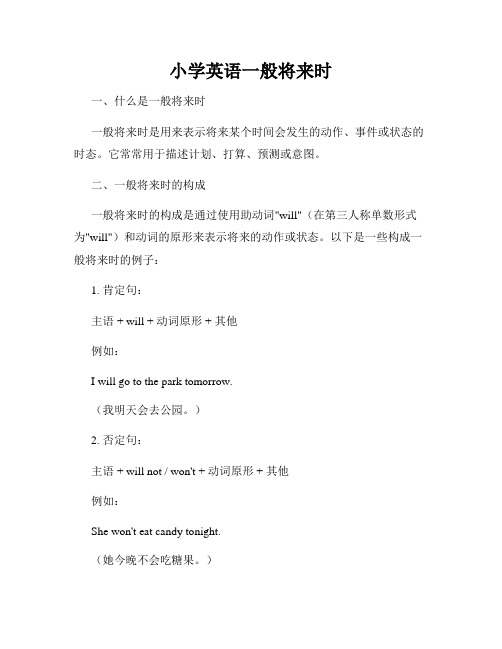
小学英语一般将来时一、什么是一般将来时一般将来时是用来表示将来某个时间会发生的动作、事件或状态的时态。
它常常用于描述计划、打算、预测或意图。
二、一般将来时的构成一般将来时的构成是通过使用助动词"will"(在第三人称单数形式为"will")和动词的原形来表示将来的动作或状态。
以下是一些构成一般将来时的例子:1. 肯定句:主语 + will + 动词原形 + 其他例如:I will go to the park tomorrow.(我明天会去公园。
)2. 否定句:主语 + will not / won't + 动词原形 + 其他例如:She won't eat candy tonight.(她今晚不会吃糖果。
)3. 疑问句:Will + 主语 + 动词原形 + 其他?例如:Will they come to the party?(他们会来参加派对吗?)三、一般将来时的使用场景下面是一些小学英语中常见的使用一般将来时的场景:1. 表示计划或打算:I will visit my grandparents next month.(我下个月会去拜访我的祖父母。
)2. 表示预测或推测:It will rain tomorrow.(明天会下雨。
)3. 表示意愿或承诺:I will help you with your homework.(我会帮你做作业。
)4. 表示未来常态:The school will start at 8:00 AM tomorrow.(明天学校将会在早上8点开始。
)5. 表示请求、命令或建议:Will you please pass me the book?(你能给我递一下那本书吗?)四、注意事项1. "will"后面的动词使用原形形式。
2. 助动词"will"可以缩写成"’ll"。
六年级英语一般将来时句子及翻译

六年级英语一般将来时句子及翻译1、我明天要去上学。
I will go yo school tomorrow。
2、明天谁将要来那里? Who will e here tomorrow?3、下周会发生什么? What will happen in the following week?4、下次你将在哪里打篮球?Where will you play basketball next time?5、这封信明天将寄出去。
The letter will be sent tomorrow。
6、这天下午我们准备开班会。
We are going to have a class meeting this afternoon。
7、我将回答那个问题。
The question will be answered by me。
8、他不会那样做的。
He wont do that。
8、他不会那样做的。
He wont do that。
9、王教授稍后将会给我们展现。
Professor Wang will give us a presentation later。
10、我将过去帮你。
Im going to help you。
11、明天早.上我要去买些东西。
I am going to buy something tomorrow morning。
12、Look at the black clouds。
Its going to rain。
看那些乌云,快要下雨了。
13、我将去买一本书。
Im going to buy a book.14、九月份我将会返校。
I will e back to school in September。
15、你会明白这个问题的。
You will understand the quest ion。
16、明天我要去北京。
I will go to BeiJing tomorrow。
17、她准备这天下午去探望王先生。
She is going to see Mr。
小学英语语法之一般将来时

一般将来时一、一般将来时:表示将来某个时间要发生的动作、事情,或存在的状态。
二、.结构:▲(1)主语+will/shall+动词原形+(其他)shall用于主语是第一人称单数,will在陈述句中用于各人称.I shall do my homework tomorrow morning.I/He/She/They will do my/his/her/their homework tomorrow morning. He will get up soon.I will=I Shall=I’ll★在表示客观事实的时候只能用此结构。
(1).It will rain tomorrow.明天将要下雨.(2).It will be Teachers'Day the day after tomorrow.后天将是教师节.(3).My birthday will come.我生日将要到了.▲(2)主语+am/is/are going to+动词原形+(其他)a.主语的意图,即将做某事。
I am going to Shanghai tomorrow.b.计划,安排要发生的事。
The play is going to be produced next month。
c.有迹象要发生的事。
Look at the dark clouds,there is going to be a storm.(3)主语+be+to+动词原形+(其他),表示按计划要发生的事或征求对方意见。
We are to discuss the report next Saturday.(4)主语+am/is/are about to+动词原形,意为马上做某事。
He is about to leave for Beijing.(5)主语+be+v-ing,表示将来,表示按计划即将发生的动作,这类动词有go,come,start,move,sail,leave,arrive,stay,live,fly。
- 1、下载文档前请自行甄别文档内容的完整性,平台不提供额外的编辑、内容补充、找答案等附加服务。
- 2、"仅部分预览"的文档,不可在线预览部分如存在完整性等问题,可反馈申请退款(可完整预览的文档不适用该条件!)。
- 3、如文档侵犯您的权益,请联系客服反馈,我们会尽快为您处理(人工客服工作时间:9:00-18:30)。
8
I’m going to buy a comic book.
tomorrow this morning this afternoon this evening next week tonight next Thursday
I am going to dance this evening.
一个时间 when
When are you going this evening?
I am going to dance this evening.
一个时间 when
When are you going to dance?
I am going to dance in the school this evening
They are going to dance this evening
I am going to dance this evening.
When are you going this evening?
I am going to dance this evening.
一个时间
When are you going this evening?
Jack and Tom ___a_r_e___going to …
+动词原形
“be going to + 动词原形”表将来 构成一般将来时态,表示计划要做的事或根据目 前推测将要发生的动作,意为“打算,将要”
“打算,将要”
I’m going to go shopping tomorrow.
4
I am going to dance this evening.
I am going to dance this evening.
一件事情
I am going to dance this evening.
一件事情 what
I am going to dance this evening.
“打算,将要”
I’m going to go shopping tomorrow.
be going to
事情
时间(表示将来)
5
clean my room
play sports do housework
go shopping
visit my grandparents
watch TV
read books
I __a_m___ going to …. You ___a_r_e___ going to … He ____is___ going to … She ___is___going to …
Jack ___i_s___ going to … My parents __a_r_e __ going to …
一件事情 what
What _______ _______ going to do this evening?
What are you doing? I am running.
I am running. What are you doing?
I am going to dance this evening.
play the piano
6
tomorrow
tonight
this evening
this afternoon
next Monday
next week
this morning
I’m going to .…
go shopping clean my room watch TV
play the piano Tomorrow .
一件事情 what
What are you going to do this evence this evening He is going to dance this evening They are going to dance this evening
I am going to draw pictures with Tom next week.(对划线部分提问) ___________ are you _________ __________ _________ with Jack?
9
I He They My sister His deskmate My grandparents He and she
read a book plant trees go for a walk collect leaves fly kites write an email
tomorrow morning this afternoon this evening next week tonight next Thursday next year
I’m going to buy a book, I’m going to take a look. I’m going to bake a cake, I’m going to walk near a lake. We are going to take a trip, We are going to take a sip, I’m going outside to play, I’m going to have a good day!
一个地点
I am going to dance in the school this evening
一个地点 where
I am going to dance in the school this evening
一个地点 where
Where are you going to dance this evening?
What are you going to do this evening?
I am going to dance this evening
What is he going to do this evening?
He is going to dance this evening
What are they going to do this evening?
